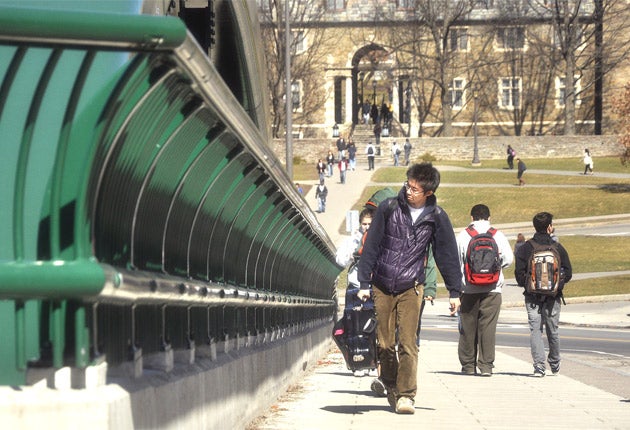Wave of student suicides hits Ivy League campus
Cornell posts lookouts on bridges after three people leap to their death

Cornell, one of the prestigious Ivy League universities in the US north-east, has taken to posting guards on the bridges over the gorges on its campus, and sending staff to check on its students, after three undergraduates fell to their deaths in suspected suicides in the last month alone.
Almost from its foundation in 1866 Cornell has had the reputation of being a "suicide school", thanks to its spectacular setting and the six rocky gorges on its grounds, which students who live on its campus have to cross daily.
But the new move comes after what university officials admit has been an "especially painful" week, during which two of the deaths occurred. A third took place on 17 February, on top of three other confirmed suicides earlier in the current academic year.
"The cumulative effect of this loss of life is palpable in our community," Susan Murphy, the university's vice-president for student and academic affairs, declared in a video address to students. Staff, she said, were knocking on student doors, and even stationed on the campus bridges, to prevent further tragedies. In fact only one of the three latest deaths have been confirmed as suicide, while the other two were under investigation. Moreover, over the last decade, the undergraduate suicide rate at Cornell, which has a student population of 20,000, has been close to the US national average of roughly 7.5 annually per 100,000 students.
A system of testing every semester, along with detailed and carefully monitored grade point averages, may place more stress on the typical US student than his or her counterpart in Britain and Europe. College is often a first experience of living away from home. In Cornell's case, however, the university's eminence and its unusual geography ensure that it gets special attention.
Cornell has launched an outreach effort, as well as posting look-outs on the bridges spanning gorges that in some cases are 100 feet deep or more. Staff members are visiting every student to check their welfare. Counselling services are being stepped up, while professors and lecturers have been told to encourage students to keep academic pressures in perspective.
The first death in the current series was that of Bradley Ginsburg, an 18-year-old first-year economics student from Florida, whose body was found under one of the bridges on 17 February, a day after he had been reported missing by his room-mate.
Last Thursday, the body of the second-year student William Sinclair, 19, from Chevy Chase, just outside Washington DC, was recovered from a gorge. On Friday a driver saw another person fall from a bridge. As of yesterday, however, the body of Matthew Zika, a third-year student, aged 21, had still not been found.
Cornell is planning more events to help students, even though the annual spring break holiday begins this weekend. One is a "Lift Your Spirits" gathering with music and a special wall on which students may write their thoughts.
In recent years other top-ranking universities here have had to cope with a series of suicides. At New York University, barriers were installed around the central hall of its library after two undergraduates jumped or fell to their deaths in 2003.
Join our commenting forum
Join thought-provoking conversations, follow other Independent readers and see their replies
Comments
Bookmark popover
Removed from bookmarks